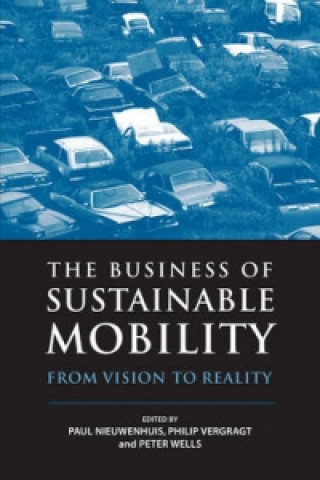
Kód: 02116124
Business of Sustainable Mobility
Autor Paul Nieuwenhuis
In many parts of the world, there is a crisis of mobility. The choices we have made over the past 200 years on modes and technologies of transport have brought us unprecedented global interaction and in many respects increased per ... celý popis
- Jazyk:
 Angličtina
Angličtina - Vazba: Pevná
- Počet stran: 256
Nakladatelství: Taylor & Francis Ltd, 2006
- Více informací o knize

2196 Kč
Dostupnost:
50 % šance Máme informaci, že by titul mohl být dostupný. Na základě vaší objednávky se ho pokusíme do 6 týdnů zajistit.
Máme informaci, že by titul mohl být dostupný. Na základě vaší objednávky se ho pokusíme do 6 týdnů zajistit.Prohledáme celý svět
Mohlo by se vám také líbit
-

Controversial History Education in Asian Contexts
6712 Kč -

Business Cycle Theory, Part II Volume 5
2311 Kč -

Aphrodite
1159 Kč -

Bannockburns
805 Kč -

Christmas Stable
320 Kč -

23 Problems in Systems Neuroscience
4399 Kč -

Basisversorgung von Vogelpatienten
1142 Kč
Dárkový poukaz: Radost zaručena
- Darujte poukaz v libovolné hodnotě a my se postaráme o zbytek.
- Poukaz se vztahuje na celou naši nabídku.
- Elektronický poukaz vytisknete z e-mailu a můžete ihned darovat.
- Platnost poukazu je 12 měsíců od data vystavení.
Informovat o naskladnění knihy
Zadejte do formuláře e-mailovou adresu a jakmile knihu naskladníme, zašleme vám o tom zprávu. Pohlídáme vše za vás.
Více informací o knize Business of Sustainable Mobility
Nákupem získáte 220 bodů
 Anotace knihy
Anotace knihy
In many parts of the world, there is a crisis of mobility. The choices we have made over the past 200 years on modes and technologies of transport have brought us unprecedented global interaction and in many respects increased personal freedom. However, all this mobility has come at a cost to society, to the economy and to the environment. Mobility is in crisis, but few seem aware of the full extent of it. Though most people will be aware of congestion, accidents (although this aspect is often overlooked), parking restrictions or fuel prices, few will have considered the effects of the dramatic increase in mobility expected in China, India and elsewhere. Nor do many people in their daily lives consider the impact of climate change on our environment and the contribution our cars make to it. It is often thought that technology alone can solve this problem. For some observers, salvation could be achieved by means of hydrogen fuel cells, by hybrid cars, or by increased fuel efficiency, or even by telematics to reduce congestion. This book shows that "technology" may well not be enough in itself and that for a genuinely sustainable transport future far more radical change - affecting many aspects of society - is needed. It is likely, for example, that new business models are needed, as well as users and consumers adopting new forms of behaviour. Disruptive technological innovation may well contribute, but needs to be induced by a combination of market forces and government regulation. Many studies touch on transport and mobility issues and more mainstream books aimed at challenging the dominance of automobility are common, yet works dealing with the longer-term strategic, theoretical and broader conceptual issues needed to inform the move towards more sustainable transport are rare. Yet policy-makers, practitioners, as well as many sections of academia, acknowledge a need for guidance on new thinking on sustainable mobility. This book brings together a range of views representing both leading-edge thinking and best practice in the mobility sector. The individual expert contributions form the basis for framing a broader vision of future mobility and proposed transition trajectories towards that future. Much of the effort reflected in the chapters in this book is concerned with going beyond the "technofix" of new cars, to confront the more difficult challenges of institutional, cultural and social change within and beyond the industry that have to be resolved in the transition towards sustainability. It therefore seeks to break through the conventional boundary between engineering and the social sciences, and the contributors come from both sides of this traditional but unnecessary divide, combining economists, engineers, geographers, designers and others. The work is based on the sustainable mobility stream in the 2003 International Greening of Industry Network conference in San Francisco. This event brought together experts from industry and government, and the book combines some of the papers presented there, developed and updated into full chapters, with a number of additional chapters to capture some of the themes that emerged from the conference. The central problem addressed in this book is the private car: how to power it, how to build it and how to deliver it to customers in a more sustainable future. It starts with ideas of radical innovation in the propulsion system of the car, notably the hydrogen fuel cell. In one section, the book examines business models that could be used to deliver automobility in a more sustainable manner. This section looks at how the car is made and used, and looks beyond it by examining how we could change those aspects in our quest for sustainable mobility. The book then considers a number of recently introduced vehicles and alternative vehicle concepts within the context of a dominant existing paradigm. These vary from a minimalist single-seat commuter to a powertrain exchange concept that could breathe new life into the electric vehicle. A number of chapters then report on current practice and experience in the initial moves toward more sustainable automobility. Finally, more visionary views are presented to look at what conclusions we can draw from the strands discussed and suggest possible future scenarios: where do we go from here? When thinking about the car, it is often not appreciated to what extent our modern culture is integrated with the car and its systems: we have literally built our world around the car in its current form, and this inevitably shapes the scope for constructing sustainable mobility. We therefore need to tackle any change to the current automobility paradigm on a very broad front and we need to be prepared for the possibly dramatic social and economic changes we may bring about by changing just some elements. The Business of Sustainable Mobility will be essential reading for academics, practitioners, policy-makers and others interested in the latest thinking on sustainable mobility.
 Parametry knihy
Parametry knihy
Zařazení knihy Knihy v angličtině Economics, finance, business & management Industry & industrial studies Transport industries
2196 Kč
- Plný název: Business of Sustainable Mobility
- Autor: Paul Nieuwenhuis
- Jazyk:
 Angličtina
Angličtina - Vazba: Pevná
- Počet stran: 256
- EAN: 9781874719809
- ISBN: 1874719802
- ID: 02116124
- Nakladatelství: Taylor & Francis Ltd
- Hmotnost: 536 g
- Rozměry: 162 × 242 × 25 mm
- Datum vydání: 01. June 2006
Oblíbené z jiného soudku
-

Wreck of the Penn Central
1054 Kč -

American Railroads
921 Kč -

Box
469 Kč -

Lost Tramways of Wales: South Wales and Valleys
250 Kč -

Air Babylon
357 Kč -

English for Cabin Crew
1457 Kč -

First Tycoon
520 Kč -

Airport Operations, Third Edition
1613 Kč -

Union Pacific
730 Kč -

Corn Belt Route
1359 Kč -

Erie Lackawanna
880 Kč -

Classic Jaguar XK
751 Kč -

Cruising Attitude
338 Kč -

Helvetica and the New York City Subway System
1071 Kč -

Rover 800 Series
751 Kč -

Titanic Captain
541 Kč -

Aerotropolis
524 Kč -

Low Cost Carrier Worldwide
1864 Kč -

Airport Design and Operation
7103 Kč -

Traffic Engineering Handbook 7e
4318 Kč -

Autocars Et Autobus Berliet
1747 Kč -

Deep Sea and Foreign Going
303 Kč -

Airworthiness
3635 Kč -

Branch Lines Around Portmadoc, 1923-46
739 Kč -

English for Cabin Crew: Audio CD
913 Kč -

Aircraft Safety
1082 Kč -

Lighthouses
202 Kč -

Mapping the Airways
536 Kč -

Project Apollo: The Moon Landings, 1968 - 1972
473 Kč -

Towards Sustainable Aviation
1335 Kč -

Crash Detectives
357 Kč -

London by Design
504 Kč -

Transport Operator Licensing
1547 Kč -

Trains, Buses, People
1297 Kč -

Rise and Fall of Harland and Wolff
507 Kč -

Fighting Traffic
1022 Kč -

Intercity Bus Lines Of The Southwest
532 Kč -

Union Pacific
684 Kč -

British Aircraft Manufacturers Since 1909
615 Kč -

Safety is No Accident: From 'V' Bombers to Concorde
678 Kč -

Building Agreement
303 Kč -

Human Factors in Multi-Crew Flight Operations
2396 Kč -

Straight and Level
1613 Kč -

Practical Aviation Security
3308 Kč -

Sustainable Aviation Futures
5140 Kč -

Blue Funnel Line
595 Kč -

Dictionary of Aviation
765 Kč -

Air Confidential
494 Kč -

Buying the Big Jets
2215 Kč
Osobní odběr Praha, Brno a 12903 dalších
Copyright ©2008-24 nejlevnejsi-knihy.cz Všechna práva vyhrazenaSoukromíCookies


 Vrácení do měsíce
Vrácení do měsíce 571 999 099 (8-15.30h)
571 999 099 (8-15.30h)